
Thursday October 13 2022
In the spring of 2022, CUPW and the other unions at Canada Post were approached by the Corporation to request our collaboration for a virtual conference on occupational Health and Safety.
However, at the same time, CPC is adopting a punitive approach towards Health and Safety. For example, with their road safety enforcement program, the Corporation’s approach is simple: imposing for each infraction an immediate suspension without pay. CUPW is against this approach and our position is that all discipline imposed on our members need to be just, reasonable and for sufficient cause and will be assessed by an Arbitrator as per the collective agreement provisions.
Further to that, a number of unresolved issues with the Short-Term Disability Program (STDP) brings into question CPC’s real intent towards Health and Safety. CPC is constantly trying to impose treatment plans to our members through their suppliers with little to no consideration of the opinion of their treating physician. We also have numerous issues with CPC’s accommodation process and had to file numerous grievances over the years on the subject.
Therefore, as long as CPC uses repressive methods to promote occupational Health and Safety, CUPW will not participate or cooperate in any way with the development and presentation of the Corporation’s virtual conference on Health and Safety scheduled in late October 2022. Our position is that, for the time being, we will only participate to collective agreement or Canada Labour Code mandated meetings.
The Union’s view is that education and training to promote Health and Safety in the workplace is a more constructive and positive way to address the issues.
Together, we will win!
In solidarity,
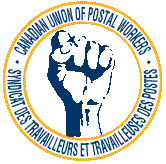
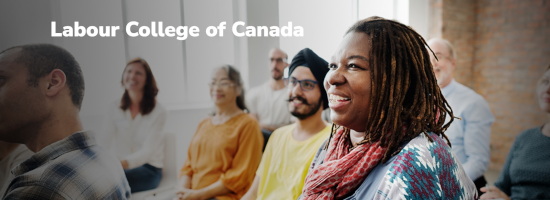
Wednesday October 12 2022
Labour College is open for applications until October 23, 2022
Labour College, the Canadian Labour Congress’ (CLC) flagship trade union leadership development program, is a unique learning opportunity for union leaders and active members to learn new skills and take on the challenges that face the labour movement. It provides university level courses on issues related to work and the rights of workers in Canada. It gives graduates the necessary tools to be effective leaders in their union, their labour council, and the wider labour movement for the benefit of all workers.
CUPW members in good standing are eligible to apply for this post-secondary program, which is offered in English. Francophones from Quebec may apply to attend Le Collège FTQ-Fonds (Programme d’éducation syndicale 2022-2023 de la FTQ-LL – Fédération des travailleurs et travailleuses du Québec (FTQ)).
The program aims to:
- build leadership skills and provide leadership tools;
- foster empowerment, self-confidence, and new networks of labour leaders;
- strengthen critical thinking skills;
- examine working class struggles and human rights issues that affect all workers; and
- create change.
SUBJECTS
|
Foundations of Political Economy |
Theory and Practice of Unions |
Strategic Thinking, Planning and Project Development |
|
Research and Communications Skills |
Truth and Reconcili-Action |
Leadership for Movement Building |
|
Education for Action/Organizing for Change |
Work and Workers in a Global World |
Governance, Laws, and Policies |
SCHEDULE*
Three intensive course sessions are offered over 14 months or longer. Each session includes online and in-person learning in addition to independent study. In-person classes are offered each year in British Columbia (BC) and/or Ontario.
SESSION 1: Unions in the Political Economy
January/February, 2023 – Online
Week of February 26 to March 3, 2023 – In person, BC
SESSION 2: Labour Leadership and Organizing Change
May/June, 2023 – Online
Week of July 16, 2023 – In person, Ontario
SESSION 3: Growing the Movement – Inside and Out
January/February, 2024 – Online
Week of February 25, 2024 – In person, BC
An orientation session will take place prior to the beginning of Session 1. The Independent Learning Project (online) will take place between sessions.
* Dates are subject to change and will be finalized 3-4 months prior to the start of each session.
WHO SHOULD APPLY? *
CUPW members in good standing who:
• Are or have been active in their union (elected position, active volunteer, committee member, etc.);
• Have attended one or more labour education course(s);
• Are active in social and economic justice issues in their community;
• Are able to make the time over a year or more to attend and prepare for online and in- person courses and complete the independent learning requirements.
Members of equity-seeking groups – women workers, workers of colour, workers with disabilities, lesbian, gay, bisexual, transgender, queer, two-spirit, intersex, and Indigenous workers – are encouraged to apply.
* If you are considering applying, please contact your Local and your Region to advise them.
HOW TO APPLY
Applications (for Cohort 10) will close on October 23, 2022, at 11:59 p.m. (Eastern Time).
All applicants are encouraged to speak with their union education representative and to identify available financial supports before submitting their application form.
To apply for the next LCC Certificate Program, start your application here: https://clcctc.checkbox.ca/lcc-application-2022—cohort-10
If you have questions about the LCC Certificate Program, please email labourcollege@clcctc.ca.
WHAT ABOUT THE COSTS?
The Joe Davidson Education Fund, as outlined in Article 11.04 of the CUPW Constitution, covers the costs for one participant and a second applicant’s costs will also be covered by CUPW.
In Solidarity,

Friday October 7 2022
N00-22-00004 (URBAN) / N00-22-R0004 (RSMC)
In August 2022, Canada Post consulted with CUPW to modify its employee recognition program, better known as the “Bravo Recognition Program”. During the national consultation, CUPW objected that the recognition program contained several violations of both the RSMC and Urban collective agreements. Among other things, the program violates CUPW’s right to act as the exclusive bargaining agent.
Specifically, through the Bravo Recognition Program, the employer is providing non-negotiated benefits to some workers and not others. Many of these non-negotiated benefits are tied to individual worker performance. CUPW has always maintained that benefits tied to individual performance are divisive, creating favouritism and ultimately undermining solidarity among workers.
Furthermore, CUPW would like to remind those who might find it enticing to accept, for example, a gift card or a prepaid gas card that, unlike a negotiated salary increase, a gift card or a gas card does not count towards your pensionable earnings. In other words, CUPW believes that negotiated wage increases or benefits for all the workers it represents will always be preferable to individual awards.
However, it should be noted that CUPW is not opposed to recognition awards such as those related to years of service (e.g.: pins for every 5 years of service or a watch after 25 years). Indeed, this is a form of recognition to which all workers will be entitled at some point in their career at Canada Post and is in no way linked to individual worker productivity.
Therefore, in light of the above, CUPW has seen fit to file two national grievances (N00-22-00004 for the Urban Unit and N00-22-R0004 for the RMSCs) denouncing the changes to the employee recognition program, better known as the “Bravo Recognition Program”.
We therefore invite you to send your Local any relevant information related to the Bravo Recognition Program in your workplace.
In Solidarity,
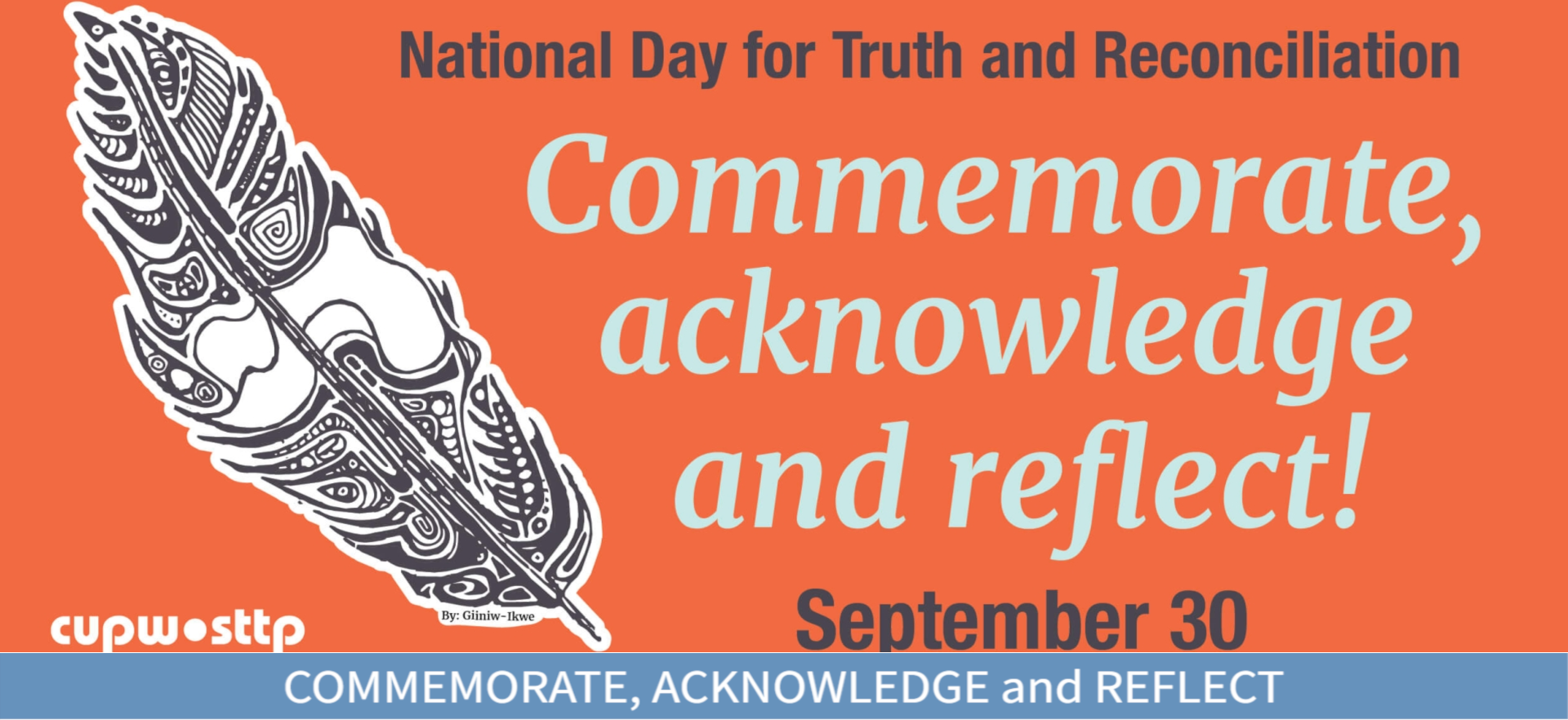

Thursday September 28, 2022
The second National Truth and Reconciliation Day will take place September 30. As one of the 94 calls to action of the Truth and Reconciliation Commission, the purpose of this day is to commemorate and honour the lives of Indigenous people killed by the State and the Church.
The Canadian State continues its colonial practices. Over and above the discovery of children’s remains on Residential School grounds, is the fact that Prime Minister Trudeau has promised change for Indigenous people and has yet to make good on these promises. Whether it be clean drinking water, confronting the unjust proportion of Indigenous people who are incarcerated, the ongoing and unaccounted for abuse of Indigenous women, girls and two-spirit folk, the brash imposition of pipelines on Indigenous territory, the ongoing theft of land and police brutality, the bulldozing of Indigenous rights remains complete.
Apologies like the one given by Pope Francis during his visit to Canada this summer are clearly insufficient. The Government and the Church were complicit in the genocidal practice of “to kill the Indian in the child.” Moreover, it was not only the Catholic Church but other denominations which took part in these unfathomable practices.
Thousands of children were stolen from their families to be murdered by the Government and the Church. Indigenous people, including some CUPW members, continue to suffer from the appalling treatment inflicted on generations of their people. For victims, and the children of those taken by the Church and State, the intergenerational trauma remains.
It is our collective responsibility to reflect on the legacy of colonialism and act to make the changes necessary to bring justice to Indigenous peoples.
Here are some things you can do on this Truth and Reconciliation Day:
- Wear your orange t-shirt
- Take some time to learn the history of colonial practices in Canada
- Read the 94 calls to action (https://www2.gov.bc.ca/assets/gov/british-columbians-our-governments/indigenous-people/aboriginal-peoples-documents/calls_to_action_english2.pdf)
- Find out whose land you are on and learn about those Indigenous nations
- Participate in a National Truth and Reconciliation Day action in your community.
In Solidarity,
Monday September 26, 2022
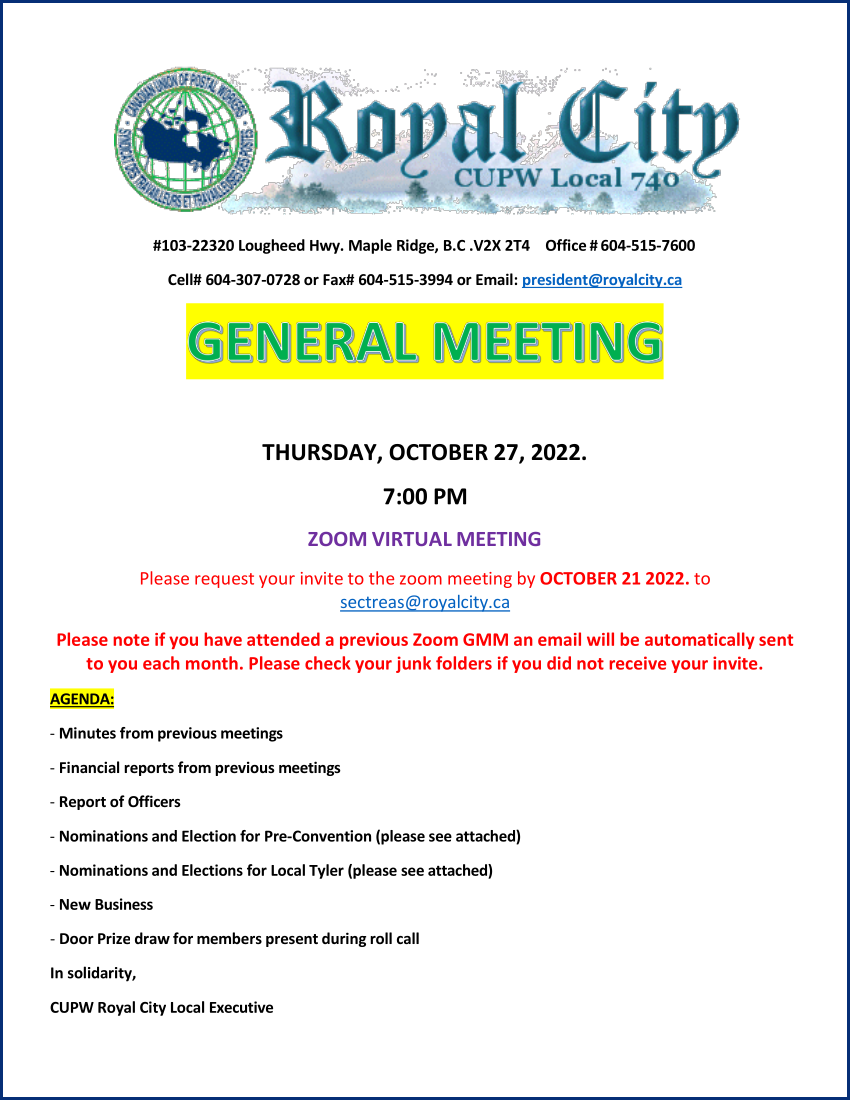
Reminder: Urban and RSMC’s
*** Please note these resolutions are for the CUPW’s National Constitution only . The CUPW National Constitution is a set of rules and guidelines the union must follow. Every 4 years, CUPW has a National Convention with delegates from across Canada who will vote on resolutions to change rules and guidelines on to how to run the union. ***
We have 15 resolutions to vote on. Our Executive hopes to see you there this Thursday night as per notice below.
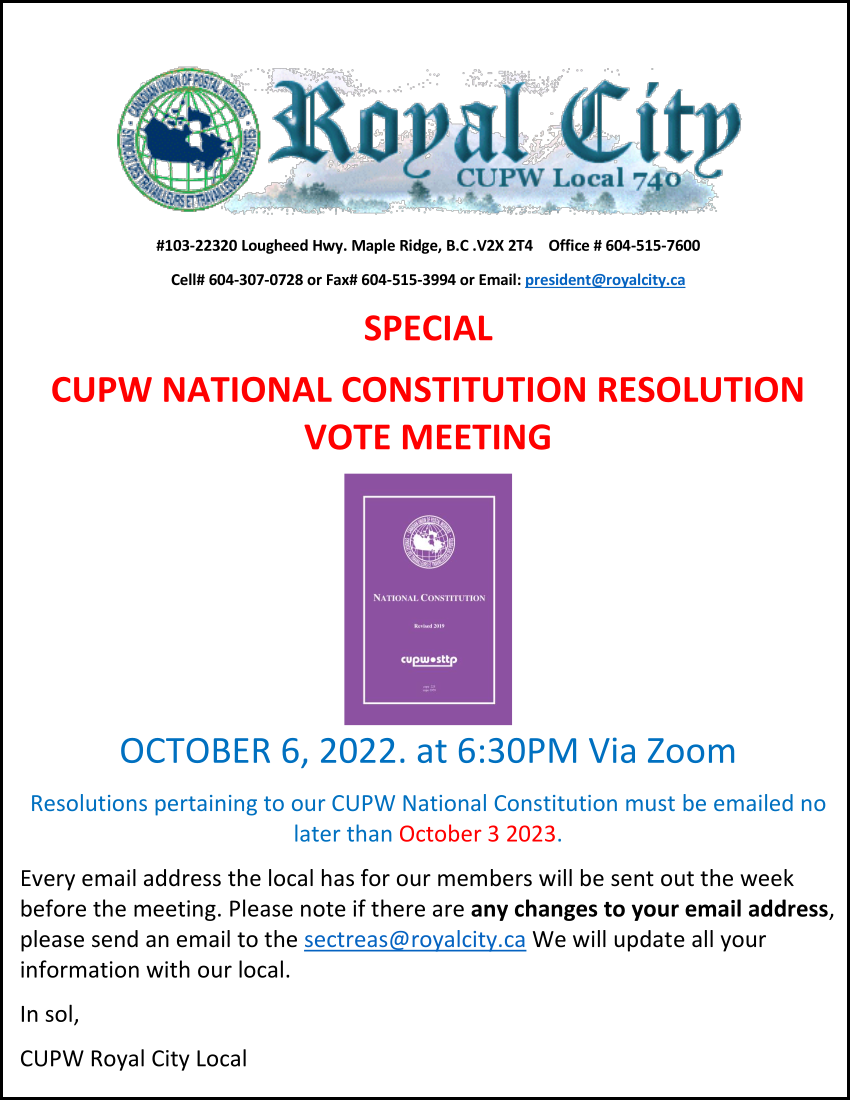

BUILDING WORKER POWER
Friday September 23, 2022
Since the National Executive Board unanimously approved Building Worker Power in August, we’ve worked diligently to put it into action. Our first major step was selecting Regional Organizers who will establish a trained and responsive internal organizing structure in each region. We thank the many members that applied to offer their considerable strengths and skills to the campaign and look forward to building up our capacity to fight the boss, together.
The NEB is pleased to introduce our eight Regional Organizers:
• Atlantic Region: Brother George Nickerson
• Quebec Region: Brother Richard Martin
• Metro-Montreal Region: Brother Thomas David-Bashore
• Central Region: Sister Cristina Ionescu
• Metro-Toronto Region: Sister Mary Hylton
• Ontario Region: Brother Asim Malik
• Prairie Region: Brother James Ball
• Pacific Region: Sister Ellen Bowles
Once they complete their initial training in Ottawa, the Regional Organizers will collaborate with the 3rd National Vice-President, their Regional Office, and the Locals within their region, and travel between locals starting in October to conduct work floor meetings, recruit new activists, and organize training opportunities for members to learn how to collectively assert their rights on their own work floors.
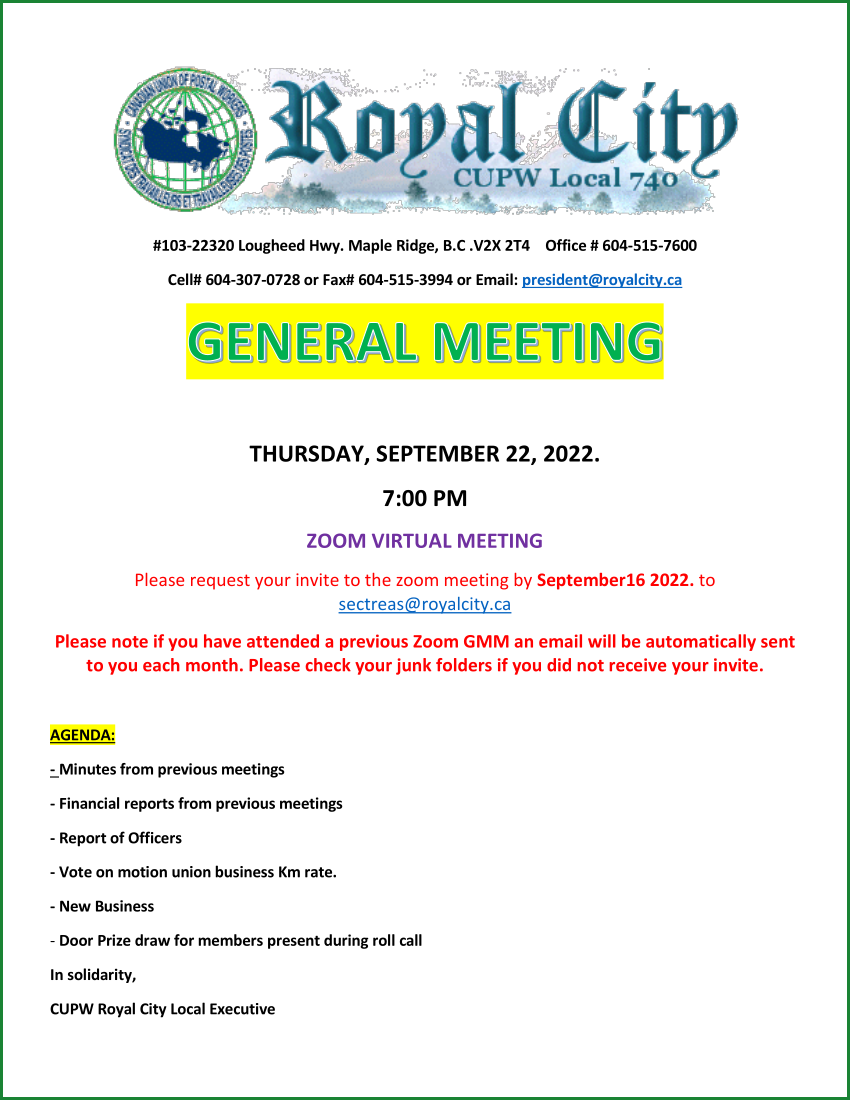
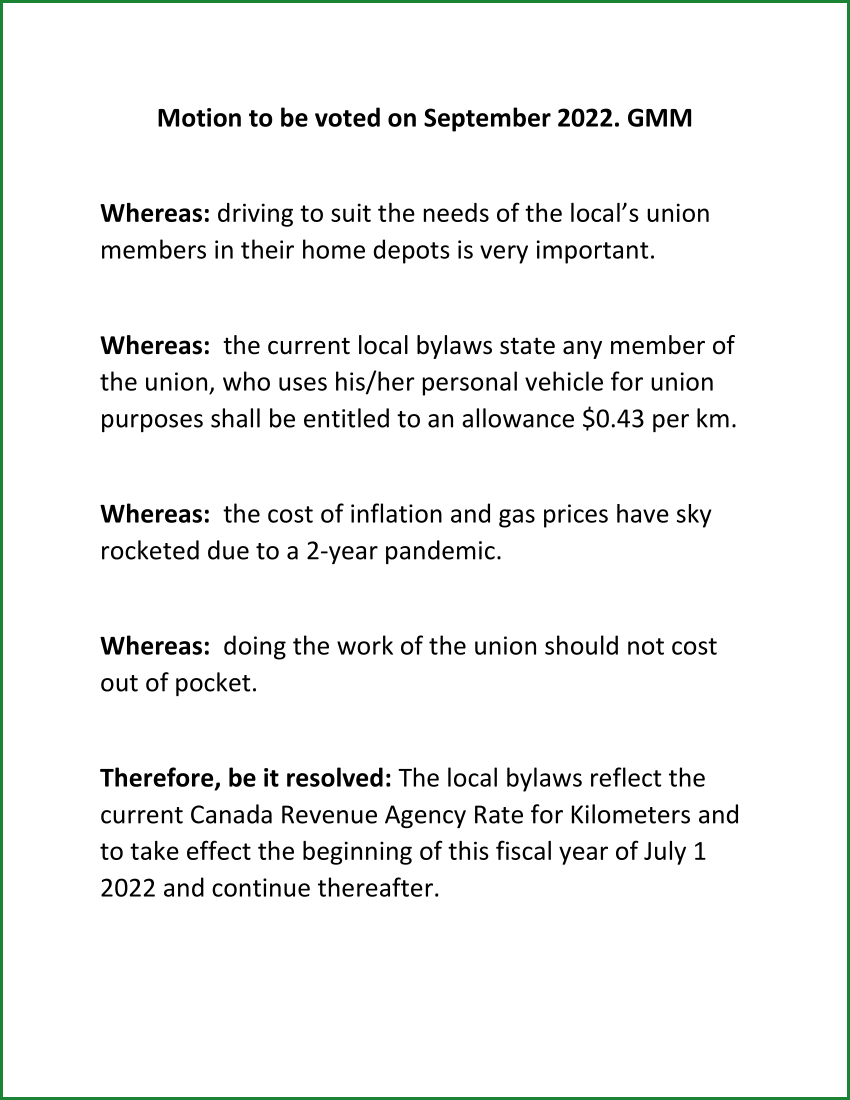
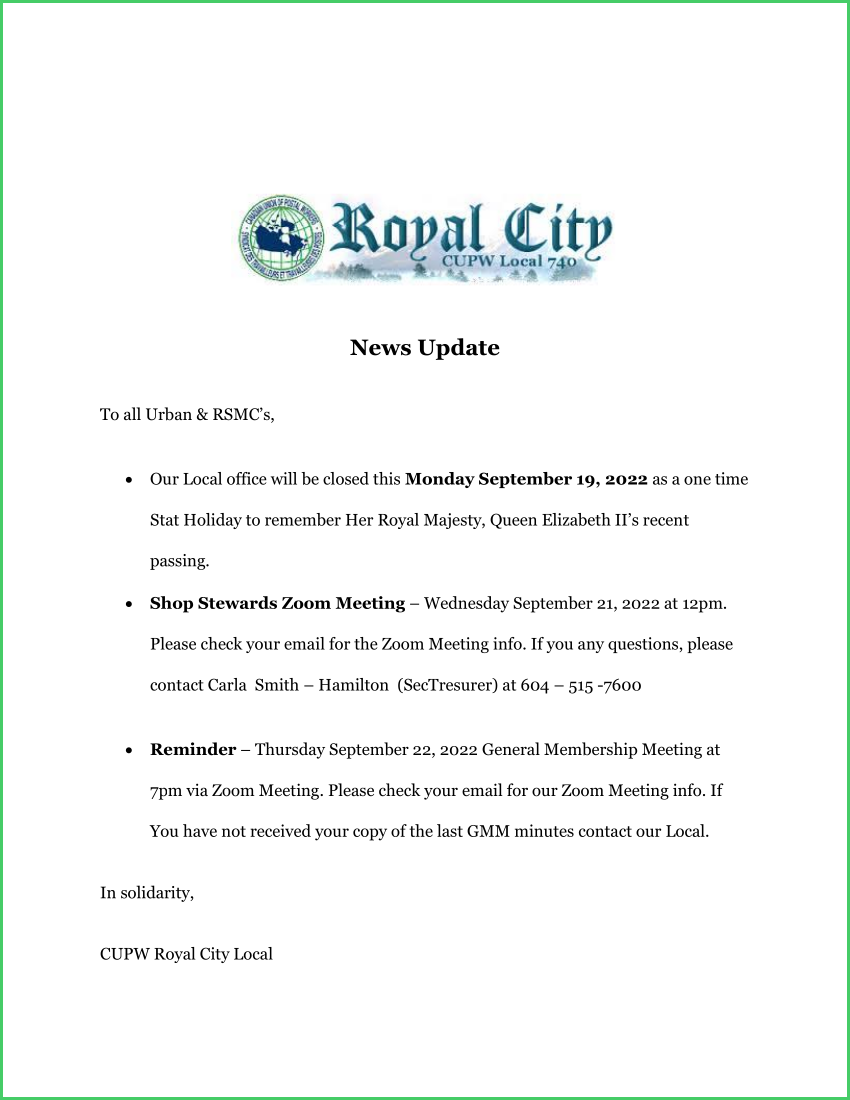
Note: Click on the closed caption option in the Youtube video to recieve the English translation

Friday September 9, 2022
Dear Sisters and Brothers, RSMC and Urban
Follow a day in the working life of Byran Arsenault. CUPW RSMC driver and Delivering Community Power campaign supporter, to learn about the benefits — challenges — of driving and electric vechicle on a rural delivery route. Byran’s story is a great illustration of the urgent necessity of building out Canada’s clean energy infrastructure, and the leading role Canada Post must play in the transition.